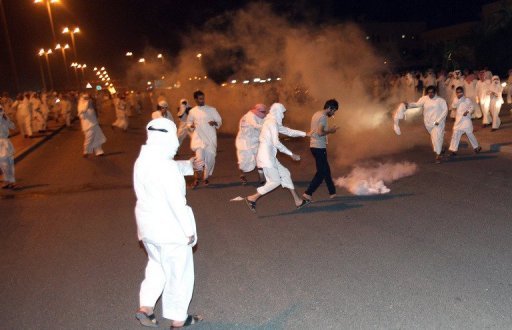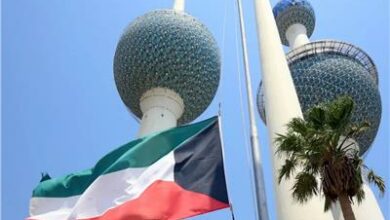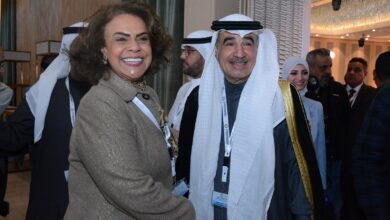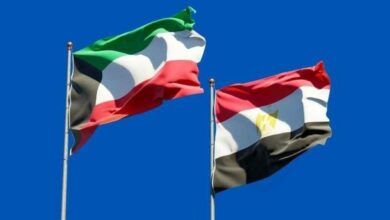
KUWAIT — On 21 October, Kuwaitis turned out in surprising numbers for a protest dubbed the “March of Dignity,” against an amendment to the electoral law for parliamentary elections hastily scheduled for 1 December.
Facing off with security forces, the protest was forcibly dispersed and prompted calls for more demonstrations by the opposition. On 4 November, a smaller yet significant number of protesters — the third meeting of its kind — defied a ban on large gatherings and was met with tear gas by riot police.
Though the demonstrators were fewer at Sunday’s rally, organizers called the protest a success, as one of the main goals was to draw attention to the amended electoral law, which has been at the heart of the conflict. Judging by the heightened media coverage this time around, it is clear to see why organizers were satisfied with the turnout.
Security forces were caught off-guard, as opposition supporters decided to change the location of the march as a last-minute tactic. They announced the new route via Twitter and forced riot police to scramble to the scene. As protests began to spill out onto a major highway, organizers called for an early end to the march and urged participants to remain peaceful, regardless of the outcome.
The battle for parliament
Kuwait is no stranger to political protests. The gridlock between the appointed Cabinet and the elected parliament has dragged on for the past six years.
Kuwait is a constitutional monarchy with the emir overseeing the three branches of government and having the final say in all matters. The power struggle between parliament and the government, dominated by the ruling al-Sabah family, is a fixture of Kuwaiti politics. The opposition sees the new electoral law as favoring pro-government parliamentarians, and is demanding it be repealed.
The legislative branch, represented by the National Assembly, is a source of pride for the majority of Kuwaitis, as it is one of the more powerful in the region. However, repeated stalemates with the government have seen parliament dissolved five times and the Cabinet reshuffled 10 times in the past six years.
“They [authorities] compare themselves to other Gulf monarchs and don’t like the fact that they have a powerful legislature. They want the authoritarian rule their neighbors have — but we will not stand for that,” says Abdullah al-Nibari, a veteran former MP who heads the Kuwait Democratic Front (KDF).
The latest escalation, which led to last month’s historic march, began a year earlier, with public pressure over a corruption scandal involving the unpopular Prime Minister Sheikh Nasser al-Mohammad al-Sabah. After allegations that the premier bribed 14 parliamentarians, pressure mounted from opposition MPs and the public.
The emir replaced the prime minister with his deputy, Sheikh Jaber al-Mubarak al-Sabah, and called for new elections the following February. Parliament was sworn in that month, and annulled four months later by the constitutional court, which cited an irregularity in the initial call for elections back in November 2011.
The court then reinstated the previous parliament, which observers say is friendlier towards the government, but attempts to implement the ruling have utterly failed. The Speaker of the House called on parliament to convene twice, but the quorum was not met either time. The majority of MPs boycotted the sessions, saying they did not want to participate in what they saw as a corrupt parliament.
The matter was then referred to the emir, who called for new elections on 1 December.
Then, in a move seen by many as an attempt to change the outcome of the upcoming elections, the government referred the electoral law to the constitutional court for review, justifying the move by saying it wanted to ensure its constitutionality before the next polls so that the incoming parliament does not face the same fate.
The court ruled in favor of upholding the existing law, and the majority welcomed the news.
Others, however, held their breath as rumors spread about the emir’s intention to amend the law via a decree of urgency, a constitutional tool that allows the emir to pass legislation he deems urgent when parliament is unable to convene. The current vacuum with parliament being dissolved leaves the space open for such decrees.
On 19 October, the emir announced the feared amendment in a televised speech, and cited “national unity” and “rejecting the misuse of democracy.”
Opposition MPs say the amendment is meant to make it difficult to form coalitions.
While there have been no recorded incidents of direct government interference in elections since the infamous 1967 polls — where police were seen swapping sealed ballot boxes with those containing already marked ballots — this is not the first time in recent history that the government has issued a decree to create a pro-government parliament.
In 1981, the emir, Sheikh Jaber al-Ahmed, issued a decree expanding the number of electoral districts from 10 to 25, which gave the government more room to manipulate results. The 1981 amendment brought in a new wave of what were dubbed “service MPs,” whose primary role was to peddle services and favors in their respective constituencies in return for siding with the government on votes.
“The protests and rallies are a recurring scenario: we have [seen this] in 1967, 1986 and 1992. It is what we have to do to face a regime which does not believe in democracy,” says Nibari.
Rising opposition
The KDF was the first group to announce its boycott of the upcoming elections. Nibari says the decision was made to protest the way the electoral law amendment was made.
“The government has been wanting to change the outcome for a while. First, they took the law to court for review, and when it was upheld, they had the emir change it through an urgency decree. We believe the matter is not urgent and, therefore, [the amendment] is unconstitutional,” he says.
Ahead of Sunday’s march, Nibari feared it would turn violent with a brutal police crackdown, predicting that the situation would worsen and could lead to “crackdowns similar to the one in neighboring Bahrain.”
Two days before, the KDF issued a statement calling on organizers to postpone the march or stage a sit-in in order to avoid clashes with the police. Viewed negatively by some, the statement led to the resignation of former MP Saleh al-Mulla from the KDF.
Meanwhile, despite the economic prosperity of the county over which the ruling authorities are banking for stability, dissidence is on the rise
According to the World Bank, Kuwait has one of the highest per capita incomes in the world, which leaves some observers wondering why protesters are taking to the streets.
“My decision to march is not a momentary decision nor is it simply because of the change in the electoral law — it is something that has been building up for a while,” says Dhari al-Rujaib, a young member of the Kuwaiti Progressive Front, a small but vocal leftist group.
“Our message is that we, the people, are partners in the political decision-making [process] and no one can take that away,” he says. The Kuwait Progressive Front represents the working class, he explains, those whose voices have been drowned out by Islamists and liberals over the years. “Dignity is at the core of all socio-economic and political struggles,” he adds.
Activist Mohammad al-Oraiman was hit on the head by a police baton three weeks ago. He was not trying to provoke the police, he says, but simply asked: “Why can’t we march peacefully?”
More than 130 protesters have been injured during the recent demonstrations, according to news agencies.
Oraiman says he joined the March of Dignity to “to send a message that no authority is higher than the authority of the people.” He says protesters no longer fear the state’s attempts at oppression. “We have the right to assemble and march, and any domestic laws that limits these rights are an attempt by authorities to oppress us,” he says.
A law issued following the 21 October march limits outdoor gatherings to 20 people, essentially banning protests.
This has not stopped tens of thousands from protesting over the past weeks, chanting: “We are the source of authority and legitimacy.”
The court then reinstated the previous parliament, which observers say is friendlier towards the government, but attempts to implement the ruling have utterly failed. The Speaker of the House called on parliament to convene twice, but the quorum was not met either time. The majority of MPs boycotted the sessions, saying they did not want to participate in what they saw as a corrupt parliament.
The matter was then referred to the emir, who called for new elections on 1 December.
Then, in a move seen by many as an attempt to change the outcome of the upcoming elections, the government referred the electoral law to the constitutional court for review, justifying the move by saying it wanted to ensure its constitutionality before the next polls so that the incoming parliament does not face the same fate.
The court ruled in favor of upholding the existing law, and the majority welcomed the news.
Others, however, held their breath as rumors spread about the emir’s intention to amend the law via a decree of urgency, a constitutional tool that allows the emir to pass legislation he deems urgent when parliament is unable to convene. The current vacuum with parliament being dissolved leaves the space open for such decrees.
On 19 October, the emir announced the feared amendment in a televised speech, and cited “national unity” and “rejecting the misuse of democracy.”
Opposition MPs say the amendment is meant to make it difficult to form coalitions.
While there have been no recorded incidents of direct government interference in elections since the infamous 1967 polls — where police were seen swapping sealed ballot boxes with those containing already marked ballots — this is not the first time in recent history that the government has issued a decree to create a pro-government parliament.
In 1981, the emir, Sheikh Jaber al-Ahmed, issued a decree expanding the number of electoral districts from 10 to 25, which gave the government more room to manipulate results. The 1981 amendment brought in a new wave of what were dubbed “service MPs,” whose primary role was to peddle services and favors in their respective constituencies in return for siding with the government on votes.
“The protests and rallies are a recurring scenario: we have [seen this] in 1967, 1986 and 1992. It is what we have to do to face a regime which does not believe in democracy,” says Nibari.
Rising opposition
The KDF was the first group to announce its boycott of the upcoming elections. Nibari says the decision was made to protest the way the electoral law amendment was made.
“The government has been wanting to change the outcome for a while. First, they took the law to court for review, and when it was upheld, they had the emir change it through an urgency decree. We believe the matter is not urgent and, therefore, [the amendment] is unconstitutional,” he says.
Ahead of Sunday’s march, Nibari feared it would turn violent with a brutal police crackdown, predicting that the situation would worsen and could lead to “crackdowns similar to the one in neighboring Bahrain.”
Two days before, the KDF issued a statement calling on organizers to postpone the march or stage a sit-in in order to avoid clashes with the police. Viewed negatively by some, the statement led to the resignation of former MP Saleh al-Mulla from the KDF.
Meanwhile, despite the economic prosperity of the county over which the ruling authorities are banking for stability, dissidence is on the rise
According to the World Bank, Kuwait has one of the highest per capita incomes in the world, which leaves some observers wondering why protesters are taking to the streets.
“My decision to march is not a momentary decision nor is it simply because of the change in the electoral law — it is something that has been building up for a while,” says Dhari al-Rujaib, a young member of the Kuwaiti Progressive Front, a small but vocal leftist group.
“Our message is that we, the people, are partners in the political decision-making [process] and no one can take that away,” he says. The Kuwait Progressive Front represents the working class, he explains, those whose voices have been drowned out by Islamists and liberals over the years. “Dignity is at the core of all socio-economic and political struggles,” he adds.
Activist Mohammad al-Oraiman was hit on the head by a police baton three weeks ago. He was not trying to provoke the police, he says, but simply asked: “Why can’t we march peacefully?”
More than 130 protesters have been injured during the recent demonstrations, according to news agencies.
Oraiman says he joined the March of Dignity to “to send a message that no authority is higher than the authority of the people.” He says protesters no longer fear the state’s attempts at oppression. “We have the right to assemble and march, and any domestic laws that limits these rights are an attempt by authorities to oppress us,” he says.
A law issued following the 21 October march limits outdoor gatherings to 20 people, essentially banning protests.
This has not stopped tens of thousands from protesting over the past weeks, chanting: “We are the source of authority and legitimacy.”



